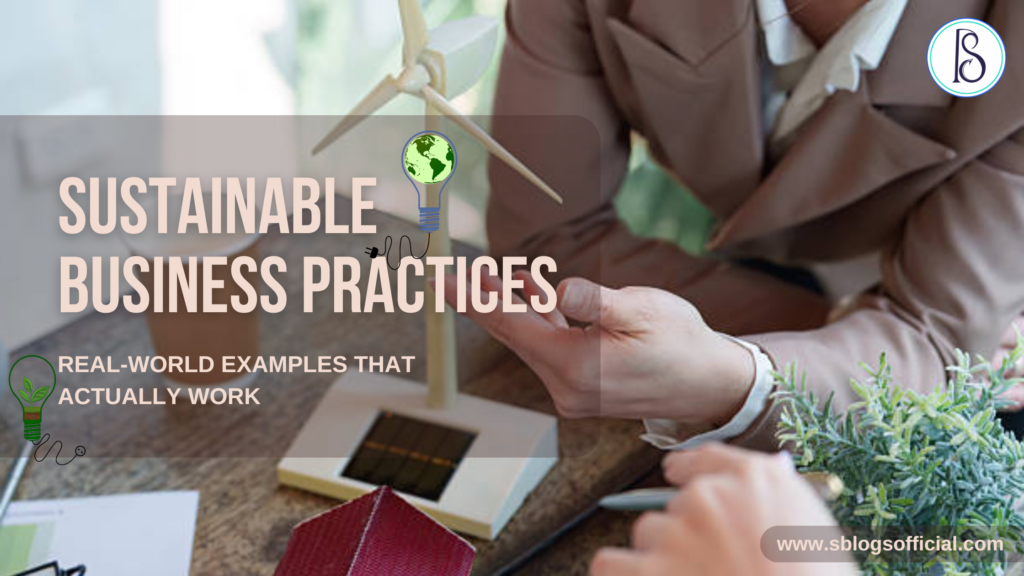
Let’s be honest – when someone mentions “going green” in business, you might roll your eyes and think about expensive solar panels or complicated recycling schemes. But here’s the thing: sustainable business practices aren’t just about saving the planet (though that’s brilliant too). They’re about saving money, attracting customers, and building a business that’ll thrive for years to come. In fact, according to Nielsen, 73% of consumers worldwide are willing to pay more for sustainable products, and this number jumps to 83% for millennials.
Sustainability examples aren’t just feel-good stories anymore – they’re smart business strategies that companies like Patagonia, Unilever, and even small local cafés are using to boost their bottom line. Whether you’re running a multinational corporation or a corner shop, there are practical ways to make your business more sustainable without breaking the bank or turning your operations upside down. From reducing waste and energy consumption to creating products that last longer, sustainable business practices are becoming the norm rather than the exception. The best part? Many of these changes will save you money whilst helping the environment – it’s what we call a proper win-win situation.
Energy Efficiency: The Foundation of Sustainable Business Practices
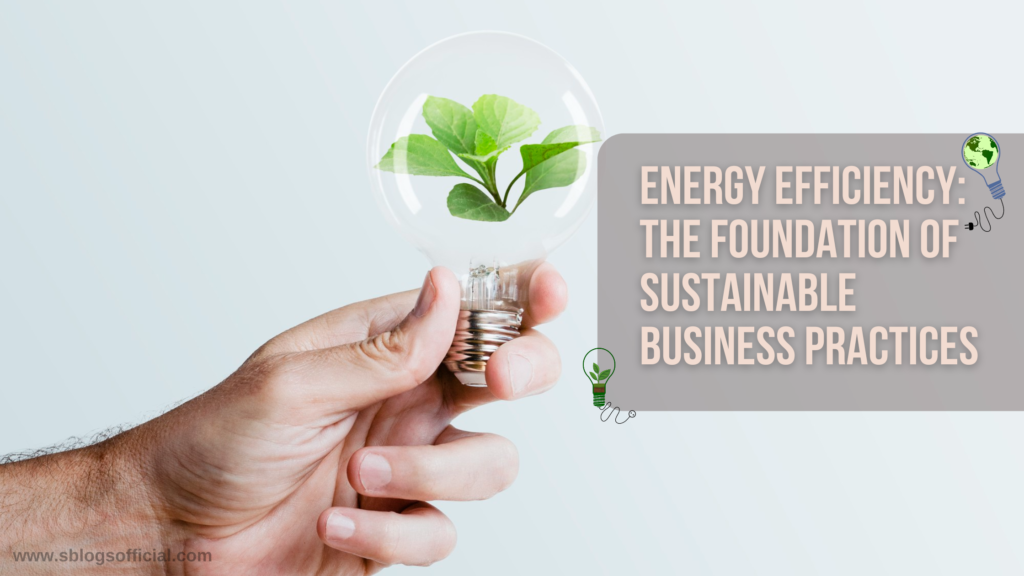
Energy efficiency is often the first step companies take when implementing sustainable business practices, and for good reason – it delivers immediate cost savings.
- Switch to LED lighting throughout your premises
- Install programmable thermostats to optimise heating and cooling
- Upgrade to energy-efficient appliances and equipment
- Implement motion sensors for lighting in less-used areas
- Consider renewable energy sources like solar panels
- Encourage remote working to reduce office energy consumption
- Use smart power strips to eliminate phantom energy usage
This concept represents one of the most straightforward examples of sustainability that businesses can implement immediately. Take Interface Inc., the carpet manufacturer, which has reduced its energy intensity by 96% since 1996 through systematic efficiency improvements. They’ve saved millions whilst dramatically reducing their carbon footprint. For smaller businesses, simple changes like switching to LED bulbs can reduce lighting costs by up to 75% according to the Energy Saving Trust.
Which is a sustainable practice that pays for itself? Energy efficiency tops the list because the initial investment typically pays back within 2-3 years through reduced utility bills. Even something as basic as properly insulating your premises or servicing your heating system regularly can yield significant savings while contributing to your sustainability goals.
Also Read- How to strengthen mind body connection | Effective Techniques
Waste Reduction: Turning Rubbish into Revenue
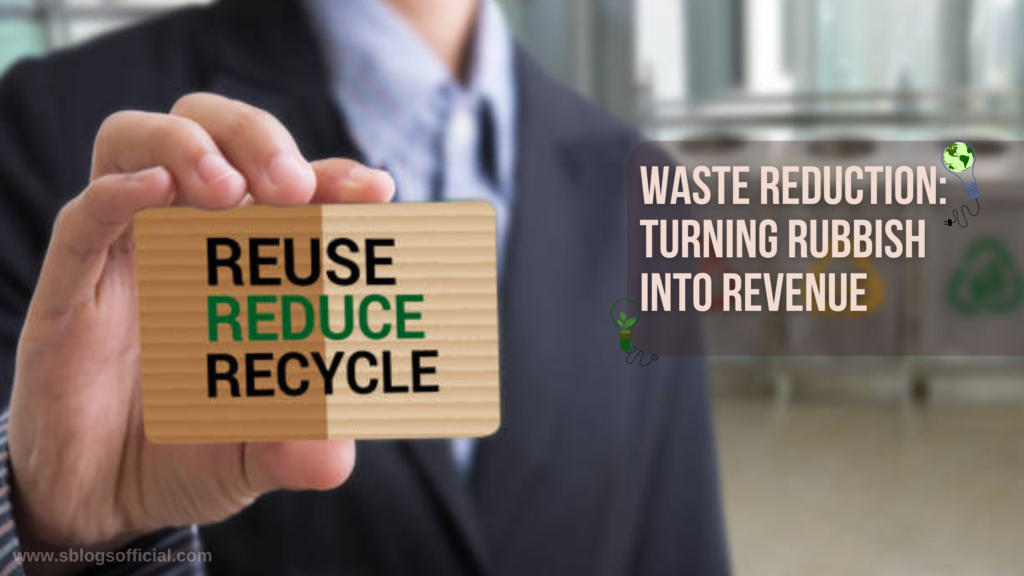
Waste reduction is one of the most visible sustainability examples and often the easiest place to start your green journey.
- Implement comprehensive recycling programmes for paper, plastic, and electronics
- Go paperless with digital invoicing and documentation
- Donate or sell items instead of throwing them away
- Introduce reusable packaging for products
- Partner with local organisations to repurpose waste materials
- Set up composting systems for organic waste
- Track waste production to identify reduction opportunities
Reduction in waste showcases some of the most impressive examples of sustainability in business. Marks & Spencer’s Plan A initiative has helped them achieve zero waste to landfill across their UK operations, saving them £185 million annually. Their approach includes everything from reducing packaging to donating unsold food to charity. For smaller businesses, waste reduction can be equally impactful. A local restaurant might start composting food scraps, reducing waste disposal costs while creating nutrient-rich soil for local gardens.
Which is a sustainable practice that most businesses overlook? Food waste reduction – the average UK business throws away 6 meals per employee per month. By implementing simple practices like better portion control, creative use of leftovers, and staff training on food handling, restaurants can significantly reduce costs while contributing to environmental goals.
Also Read- Healing power of herbs | Powerful Health Benefits
Environmentally Friendly Business Ideas: Green Products and Services
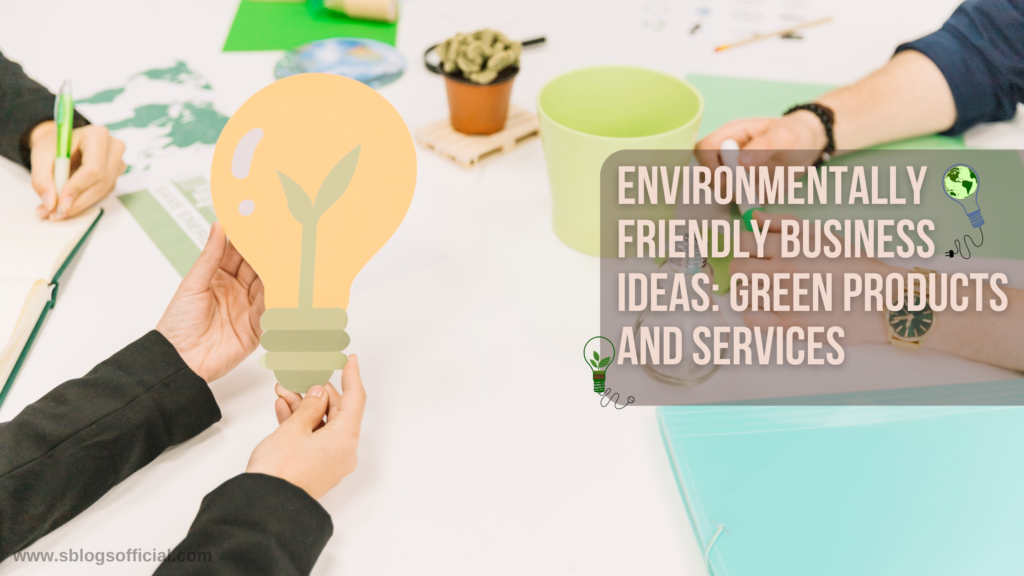
Creating or adapting products and services with sustainability in mind represents the next level of sustainable business practices.
- Design products for durability and repairability
- Use recycled or biodegradable materials in manufacturing
- Offer product take-back programmes for recycling
- Develop digital alternatives to physical products
- Create modular products that can be upgraded rather than replaced
- Partner with suppliers who share your sustainability values
- Obtain relevant certifications like Fair Trade or Forest Stewardship Council
Environmentally friendly business ideas are reshaping entire industries. Patagonia’s “Don’t Buy This Jacket” campaign actually increased sales by encouraging customers to buy less but buy better. Their repair services and lifetime guarantee demonstrate how sustainability can become a unique selling point. Similarly, The Body Shop built an empire on ethical sourcing and refillable products long before it became trendy. For smaller businesses, this might mean a bakery switching to compostable packaging, or a cleaning company using only eco-friendly products.
Which is a sustainable practice that builds customer loyalty? Transparency about your environmental impact and genuine efforts to improve. Customers increasingly want to support businesses that align with their values, making sustainability a powerful differentiator in crowded markets.
Also Read- Scientific Discoveries That Changed the World in a Bad Way
Supply Chain Sustainability: Examples of Sustainability in Action
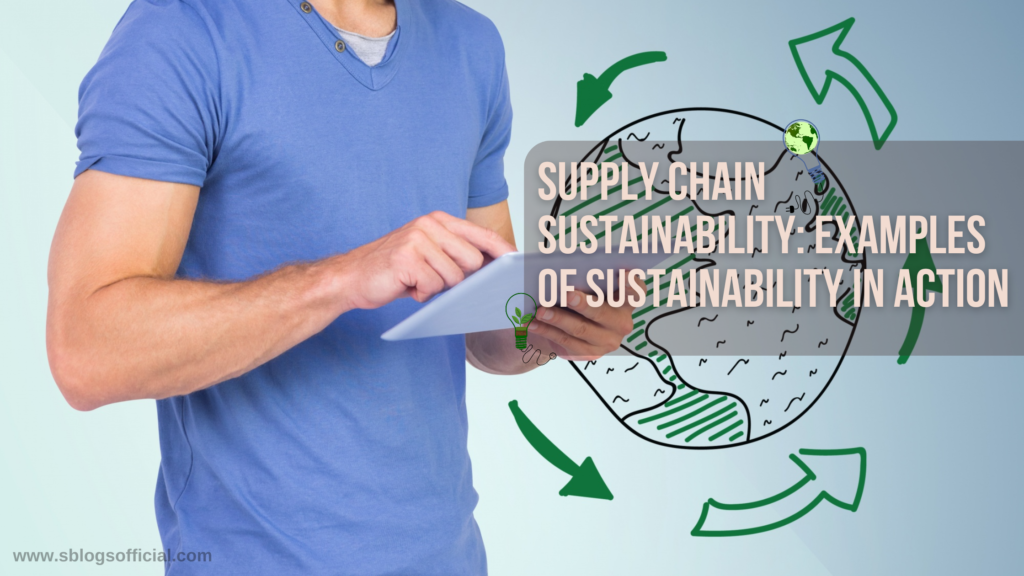
Sustainable supply chains represent some of the most impactful examples of sustainability because they extend your environmental influence beyond your immediate operations.
- Source materials locally to reduce transportation emissions
- Work with suppliers who have strong environmental standards
- Implement ethical sourcing policies for raw materials
- Reduce packaging throughout the supply chain
- Optimise delivery routes to minimise fuel consumption
- Use sustainable transportation methods where possible
- Conduct regular audits of supplier sustainability practices
Supply chain sustainability offers numerous sustainability examples that can transform entire industries. Unilever’s Sustainable Living Plan includes working with suppliers to improve water usage, reduce greenhouse gas emissions, and enhance worker welfare across its global supply chain. They’ve found that these initiatives not only reduce environmental impact but also improve supplier relationships and product quality. For smaller businesses, this might mean choosing local suppliers over distant ones, not just for freshness but to reduce transportation emissions.
Which is a sustainable practice that often gets overlooked? Building long-term relationships with suppliers who share your values. This approach leads to better collaboration on sustainability initiatives and often results in cost savings through improved efficiency and reduced waste.
Also Read- Holistic Health & Healing | A Complete Guide to Natural Wellness
Employee Engagement: Making Sustainability Everyone’s Business
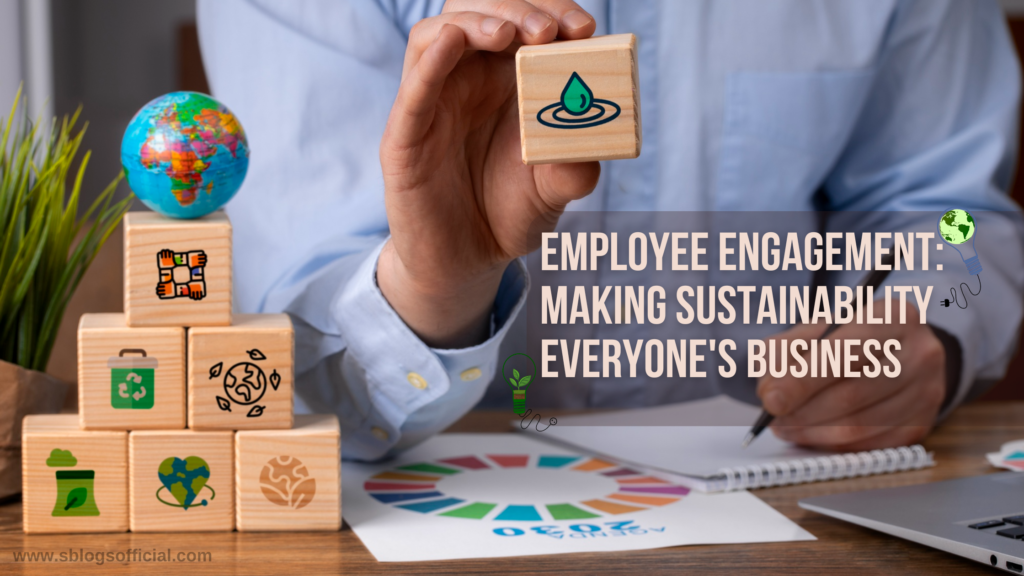
Employee engagement in sustainable business practices ensures that your green initiatives succeed and continue to evolve.
- Provide sustainability training for all staff members
- Create green teams to champion environmental initiatives
- Implement suggestion schemes for sustainability improvements
- Offer incentives for eco-friendly commuting
- Include sustainability metrics in performance reviews
- Encourage volunteering for environmental causes
- Make sustainability part of your company culture
It represents one of the most overlooked examples of sustainability in business. When staff understand and embrace sustainable practices, the results can be remarkable. 3M’s “15% Time” programme, which allows employees to spend 15% of their time on personal projects, has led to numerous sustainability innovations, including their famous Post-it Notes made from recycled materials. For smaller businesses, this might mean appointing sustainability champions or simply encouraging staff to suggest improvements.
Which is a sustainable practice that builds team morale? Involving employees in sustainability decision-making. When people feel their ideas matter and see the impact of their efforts, they become more invested in the company’s success. This approach not only improves environmental performance but also boosts job satisfaction and retention.
Also Read- Alternative Medicine for Pain & ADHD | Natural Solutions
Overcoming Business Sustainability Challenges
While implementing sustainable business practices offers numerous benefits, businesses often face challenges that need addressing.
- Start small with pilot programmes before scaling up
- Seek funding through green business grants and incentives
- Partner with other businesses to share costs and knowledge
- Measure and communicate the financial benefits of sustainability
- Address staff resistance through education and training
- Use technology to track and improve sustainability metrics
- Stay informed about changing regulations and standards
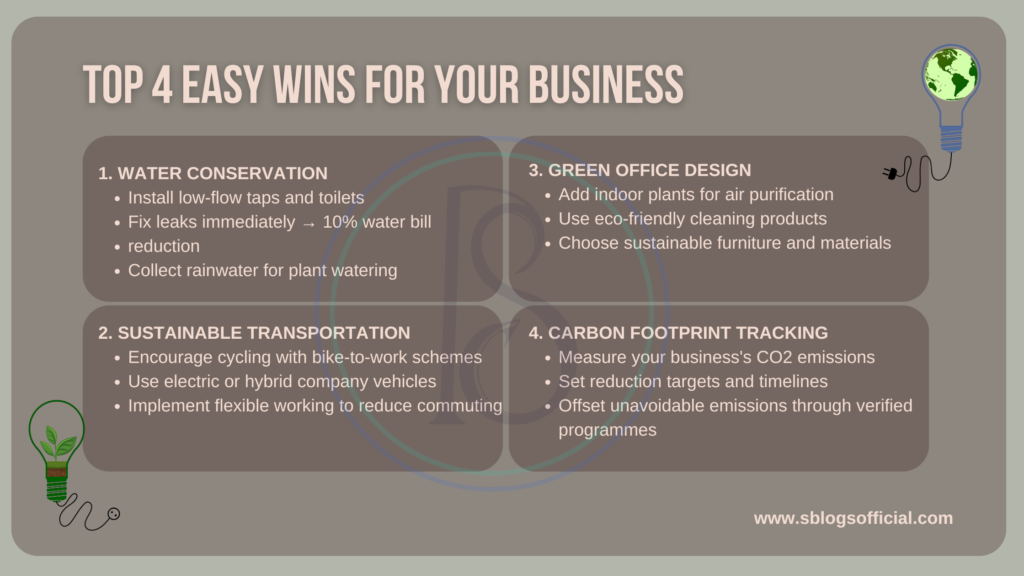
Business sustainability challenges are real, but they’re not insurmountable. Many companies worry about upfront costs, but research from Harvard Business School shows that sustainable businesses outperform their peers by 4.8% in stock performance and 3.5% in accounting performance. The key is viewing sustainability as an investment rather than an expense. For smaller businesses, challenges might include limited resources or lack of expertise. However, organisations like the Carbon Trust offer free advice and support to help businesses get started.
Which is a sustainable practice that addresses multiple challenges? Starting with quick wins that demonstrate value. Simple changes like reducing paper usage or switching to renewable energy can show immediate results, building confidence and momentum for larger initiatives.
Also Read- Fitness Tips for Busy People | Quick Workouts & Easy Solutions
Making Sustainable Business Practices Work for You
The beauty of sustainable business practices lies in their flexibility – there’s no one-size-fits-all approach. Whether you’re inspired by Patagonia’s radical transparency, Interface’s Mission Zero, or simply want to reduce your energy bills, the key is to start where you are and build from there. Sustainability examples from successful businesses show that green practices aren’t just good for the planet – they’re good for business too. By reducing waste, improving efficiency, and building customer loyalty, sustainable business practices create value that extends far beyond environmental benefits.
Remember, sustainability isn’t a destination – it’s a journey. Each small step you take towards more environmentally friendly business ideas contributes to a larger movement whilst strengthening your business for the future. The question isn’t whether you can afford to implement sustainable practices, but whether you can afford not to.
For more information on sustainable practices that could maintain a balance for a healthy life, subscribe to our blog and explore our blogs curated for better health and well-being.

Your article helped me a lot, is there any more related content? Thanks!
I’m glad to know you liked it. you can check on our blog there few topics that will help you to know more about the sustainable life management under health and wellness category. please feel free to reach out to us through the contact form. Thank you.